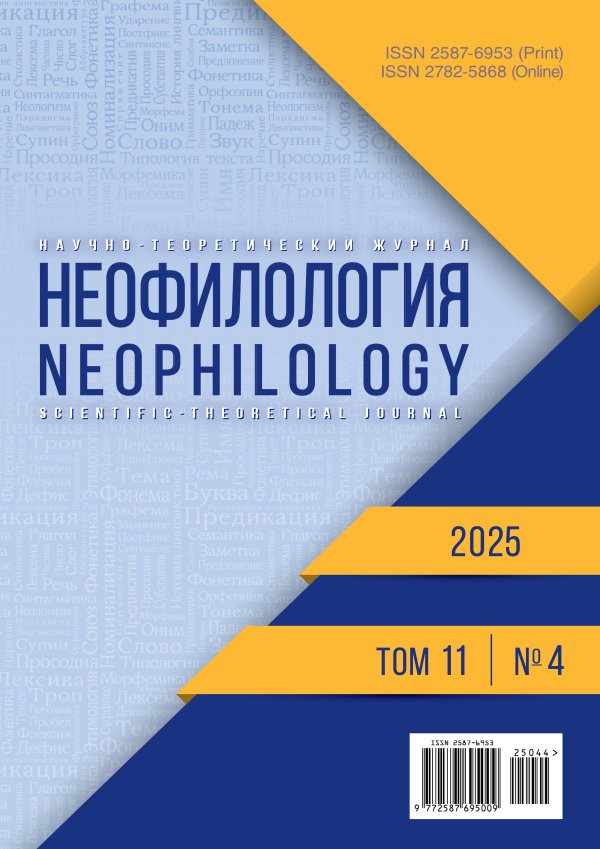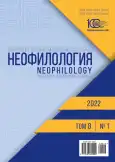Грамматические средства выражения категории темпоральности в англоязычном естественнонаучном учебном тексте
- Авторы: Кащеева А.В.1
-
Учреждения:
- ФГБОУ ВО «Тамбовский государственный университет им. Г.Р. Державина»
- Выпуск: Том 8, № 1 (2022)
- Страницы: 81-90
- Раздел: ЯЗЫКИ НАРОДОВ ЗАРУБЕЖНЫХ СТРАН (ГЕРМАНСКИЕ ЯЗЫКИ)
- URL: https://journal-vniispk.ru/2587-6953/article/view/301826
- DOI: https://doi.org/10.20310/2587-6953-2022-8-1-81-90
- ID: 301826
Цитировать
Полный текст
Аннотация
Поставлена проблема влияния категории темпоральности на когнитивный потенциал англоязычного учебного текста. Актуальность проблемы обусловлена тем, что когнитивные аспекты учебных текстов недостаточно разработаны, несмотря на многообразие в разных тематических областях. Цель заключается в исследовании темпоральности как онтологической тестовой категории, анализе её влияния на когнитивную специфику текстов и выявлении типичных грамматических средств выражения темпоральности в учебных естественнонаучных текстах. Использованы методы анализа теоретических положений о природе категории темпоральности, а также качественный и концептуальный анализ языкового материала на примере естественнонаучных учебных текстов на английском языке. Полученные результаты свидетельствуют о том, что теоретическими предпосылками описания структуры текстовой категории темпоральности являются семантический и функциональносемантический аспекты и принцип поля. Практически выявлено, что используемые грамматические средства категории темпоральности в учебных текстах указанного типа способствуют передаче знаний о закономерных, статичных явлениях, истории и результатах исследований в широком промежутке времени. Показано, что грамматические средствам темпоральности, традиционно считающиеся периферийными, значительно влияют на когнитивный потенциал учебных текстов указанного типа за счёт выражения фокуса. На основании анализа сделан вывод о том, что категория темпоральности учебных естественнонаучных текстов обусловливает особенности их стиля и способность передавать универсальные знания, которые нечётко структурированы во времени.
Об авторах
А. В. Кащеева
ФГБОУ ВО «Тамбовский государственный университет им. Г.Р. Державина»
Автор, ответственный за переписку.
Email: kashcheyeva@mail.ru
ORCID iD: 0000-0002-2560-4340
кандидат педагогических наук, доцент, доцент кафедры зарубежной филологии и прикладной лингвистики
Россия, 392000, Российская Федерация, г. Тамбов, ул. Интернациональная, 33Список литературы
- Болдырев Н.Н. Взаимодействие первичных и вторичных структур в языковой картине мира как фактор её динамики // Когнитивные исследования языка. Вып. № 3 (46). Язык и мышление в эпоху глобальных перемен. Москва; Тамбов; Н. Новгород, 2021. С. 26-30.
- Кубрякова Е.С. О тексте и критериях его определения // Текст. Структура и семантика. Т. 1. М.: СпортАкадемПресс, 2001. С. 72-80.
- Кубрякова Е.С. Язык и знание: На пути получения знаний о языке: Части речи с когнитивной точки зрения. Роль языка в познании мира. М.: Языки славянской культуры, 2004. 560 с.
- Тураева З.Я. Лингвистика текста. М.: Просвещение, 1986. 127 с.
- Кубрякова Е.С. В поисках сущности языка // Вопросы когнитивной лингвистики. 2009. № 1. С. 5-12.
- Копытов О.Н. О фундаментальных категориях текста // Вестник ИГЛУ. 2011. № 3 (15). С. 149-157.
- Москальчук Г.Г. О лингвистических измерениях текста // Вестник ЧелГУ. 2016. № 4 (386). С. 135-138.
- Баженова Е.А. Структура нового знания в научном тексте // Вестник ТГПУ. 2020. № 4 (210). С. 144-151.
- Галич Г.Г., Клёстер А.М. Профессиональный дискурс как среда функционирования категорий мышления // Вестник ЧелГУ. 2018. № 6 (416). С. 28-35.
- Должич Е.А. Когнитивно-дискурсивное пространство научного текста // Учёные записки ОГУ. Серия: Гуманитарные и социальные науки. 2016. № 2 (71). С. 121-123.
- Кокова А.В., Сорокина Т.В. Объективация когнитивной структуры building (строительство) в англо язычном научно-техническом дискурсе // МНКО. 2020. № 2 (81). С. 409-411.
- Манерко Л.А., Суханова А.С. Понимание соотношения концептуальной области и дискурса // Когнитивные исследования языка. Вып. № 4 (47). Методы когнитивной лингвистики: гордость или предубеждение? Москва; Тамбов; Н. Новгород, 2021. С. 127-133.
- Степанова Е.С. Лингвокогнитивные особенности научно-популярного медицинского дискурса // Вестник ТГПУ. 2019. № 4 (201). С. 95-101.
- Гелдилиева А.А. Цвет как паралингвистическое средство реализации текстовых категорий в учебных поликодовых текстах // Современное педагогическое образование. 2020. № 11. С. 223-227.
- Гиловая Е.А. Лингвистические и феноменологические когнитивные структуры как отражение смысловой организации математического текста // Сервис +. 2021. № 2. С. 45-50.
- Коновалова Н.И. Современный учебный текст по русскому языку: механизмы восприятия и принципы конструирования // Филологический класс. 2020. № 1. С. 164-172.
- Лысакова И.П., Железнякова Е.А. Лингвокогнитивные особенности учебного текста // Вестник ВолГУ. Серия 2: Языкознание. 2018. № 3. С. 166-173.
- Мартынова Е.В., Солнышкина М.И., Мерзлякова А.Ф., Гизатулина Д.Ю. Лексические параметры учебного текста (на материале текстов учебного корпуса русского языка) // Вестник ТГГПУ. 2020. № 3 (61). С. 72-80.
- Панюшкина П.Ю. Особенности и характеристика учебных текстов для студентов медицинского вуза // The Scientific Heritage. 2021. № 61-3. С. 43-45.
- Теория функциональной грамматики. Темпоральность. Модальность / отв. ред. А.В. Бондарко. Л.: Наука, 1990. 264 с.
- Нильсен Е.А. Репрезентация темпоральности в текстах интервью (на материале американских газет) // Знак: проблемное поле медиаобразования. 2020. № 4 (38). С. 211-218.
- Усенко Н.М. Некоторые аспекты функционирования темпоральности в лингвистике // Вестник Таганрогского института имени А.П. Чехова. 2019. № 1. С. 220-223.
- Болдырев Н.Н. Когнитивная семантика. Введение в когнитивную лингвистику. Тамбов: Изд. дом «Державинский», 2021. 236 с.
- Дубровская О.Г. Когнитивно-дискурсивная интерпретанта как приём анализа социокультурной специфики дискурса // Когнитивные исследования языка. Вып. № 4 (47). Методы когнитивной лингвистики: гордость или предубеждение? Москва; Тамбов; Н. Новгород, 2021. С. 535-542.
- Конькова А.С. Реализация текстовой категории темпоральности в ток-шоу как типе дискурса // Вестник Московского государственного лингвистического университета. Гуманитарные науки. 2016. № 5 (744). С. 150-158.
Дополнительные файлы










